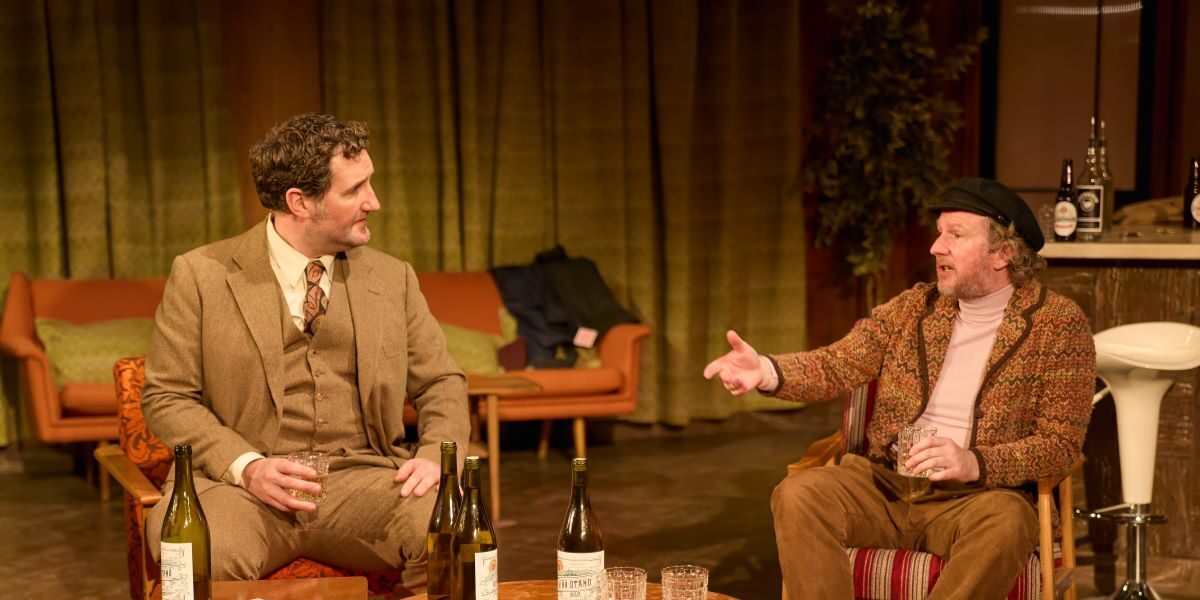Richard Bean first made his name through Under the Whaleback and now he returns to the hard-bitten lives of fisherman engaged in long-distance voyages into the Arctic Circle. This play is set in 1976 and elaborates and re-imagines a real-life tragedy in which the majority of a trawler crew died in a sudden February storm off Iceland.
The play comprises two acts which could not be more different from one another whether in theme or treatment. The first takes us into the world of Donald Claxton, owner of a trawler fleet. We encounter him in his office with huge warehouse windows overlooking the docks. He is a mass of contradictions – apparently a hard-faced capitalist boss, but also a man of sensitivity who was the first of his family to go to Oxford. Someone who is driven by profit margins, but also is stricken by the recent loss of his ship and the prospect of having to meet all the widows in a traditional walk around the town. In a sequence of scenes we see him engage in radio contact with one of his skippers, offer support to his secretary, joust mildly with his semi-retired father, sack one of his employees who has failed to deliver, and make arrangements for the funeral services of his dead crew with a local clergyman. But the most memorable encounter is with one of the wives, who tackles him first with bristling hostility, before a subtle and multi-layered encounter develops which softens both their edges and gives a wonderful sense of the textures of life, its rawness and its moments of fulfilment, within a fishing community. The writing is both tight, supple and expansive as it needs to be. We are sent into the interval fully primed with characters and backstory for what is to come later.
The second act takes us to Reykjavik and could not be more different. The survivors of the lost ship, and one in a coffin, are gathered in a hotel wearing donated clothes, trying to find elaborate ways to evade alcohol laws. Claxton arrives unexpectedly to pick up the tab and arrange for them to fly home. Instead, he becomes the focus of recriminations which then open out as the drunken evening develops into a sequence of stories covering a gamut of sea lore, embroidered memories and spooky narratives. The whole act is much more leisurely than the first and almost operatic as each of the stories unfolds like a sequence of stately da capo arias in a Baroque opera. It is a tribute to the skill of the author that he can write across such contrasting genres; but the sedate pace of exposition, despite the incidents of somewhat contrived hostility designed to punctuate and enliven things, does begin to pall before a genuinely moving elegiac conclusion.
The detailed sets, by Anna Reid, summon up the shabby tackiness of 70s interiors and do a lot to reinforce the plausibility of the drama. Similarly the sound and lighting design underscore key moments in the action with credible interventions. The collective contribution of the creative team impresses here for the meticulous recreation of period style and nuance.
The acting is uniformly excellent from the whole cast of seven (there is a degree of skilful doubling up of roles across the two acts). John Hollingworth, as Donald Claxton, is the hinge around which the play revolves. In the first half he is the mirror in which we see and experience conflicting impressions of this now vanished way of life; whereas in the second, he is the helpless but of hostility for much of the time; but he has the final word, as the last story teller. This is a precisely curated, sensitive performance. Paul Hickey doubles up as Claxton Senior and as Quayle, a loner and teller of the tallest tales; Matthew Durkan offers two remarkably contrasted performances as the ‘communist’ vicar and as Jack, selfish husband, unpredictable sailor, and not the brightest bulb; and Matt Sutton is the stalwart Baggie, the bosun who quietly holds the group together. Adam Hugill takes on the youngest male roles – the skipper getting the sack in the first half, and the naive but charming young apprentice in the second. While the women’s roles are less prominent by the nature of the piece, both Sophie Cox and Laura Elsworthy provide memorable contributions, with Cox particularly impressive as an Icelandic hotel manager.
This is a memorable production of a play that well deserves the wider audience of a future West End transfer.
Writer: Richard Bean
Director: Emily Burns
Cast: Sophie Cox, Matthew Durkan, Laura Elsworthy, Paul Hickey, John Hollingworth, Adam Hugill, Matt Sutton
Until 23 November 2024
2 hrs 40 mins with interval
Photo Credit: Mark Douet

